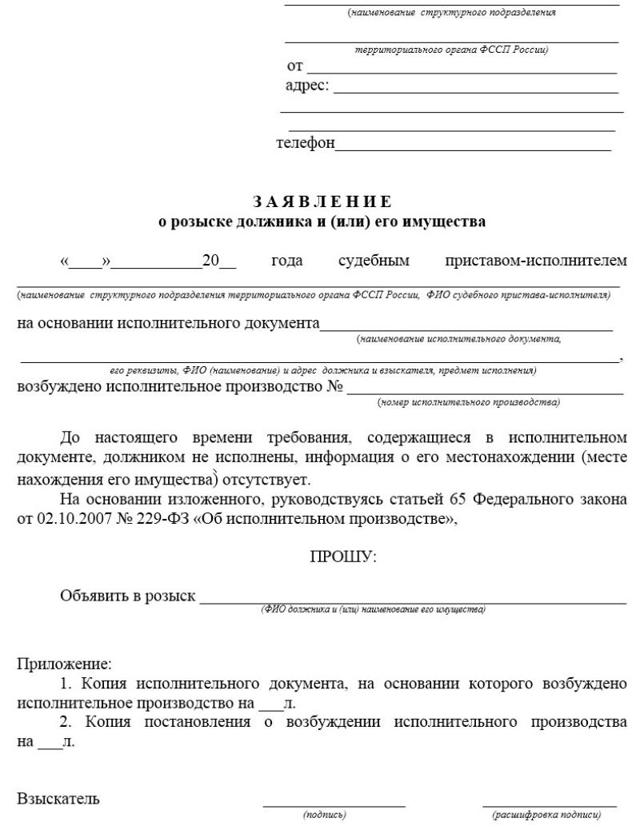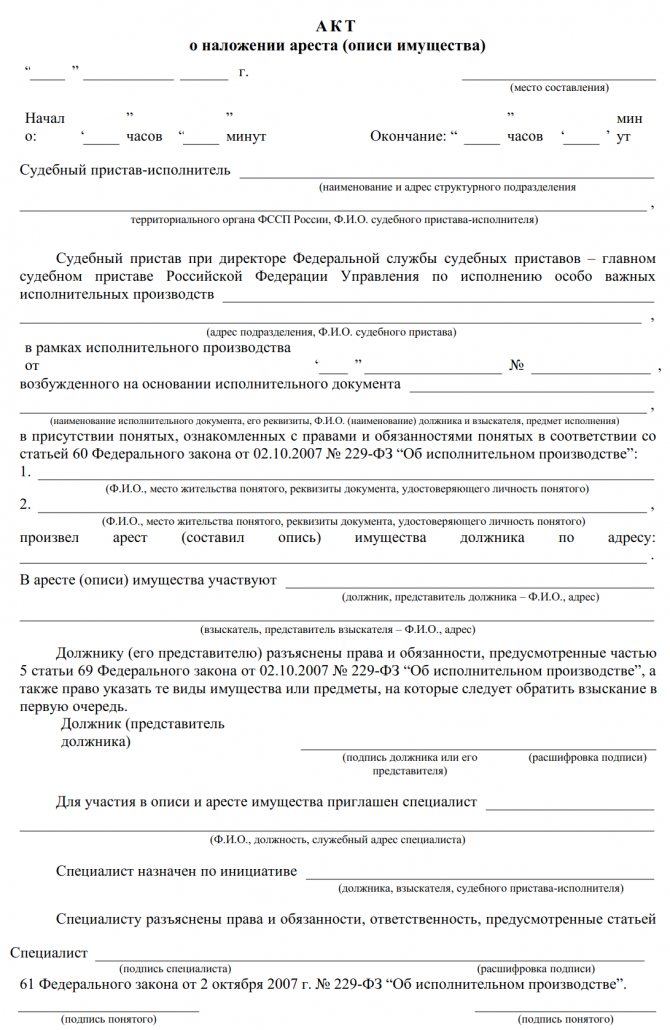Legal advice > Administrative law > Search for a debtor in enforcement proceedings: circumstances, resolution, features of the procedure
Often people begin to regret their financial obligations. They cannot or do not want to repay their debts, and decide that in this situation it is best to disappear from the sight of creditors, that is, to run away. Preferably with all your property. How can you find such people and make them pay their bills?
Law of the Russian Federation No. 229 in Article 65 states that creditors have the right to search for a debtor if the bailiffs executing the demands do not have information where this person may be located.
A wanted notice can be submitted both at the borrower’s place of residence and at the place of residence where the borrower was most recently registered. This is the first step in order to search for the debtor throughout the country.
What are the bailiffs looking for: searching for the debtor or his property?
A debtor is considered a person who has unfulfilled obligations to an individual or legal entity or the budget. But not every debtor can be put on the wanted list.
The law establishes the reasons when a bailiff can issue a search order, but in practice, a search requires a demand from the recoverer. The search for debtors by bailiffs is carried out in relation to a citizen whose location is unknown, and there is a debt for:
- loans from 10,000 rubles;
- alimony;
- compensation for harm caused to the health of other citizens;
- compensation for harm from a crime;
- fines.
According to the last 4 points, the amount of debt is not important for tracing the debtor.
Is it worth hiding?
Changing your last name and moving will not help - the bailiff will request information about passports from the FMS and the Ministry of Internal Affairs, and they will find the person.
Search database on the FSSP website
More often, debtors hide property - they transfer it to other citizens, give it to relatives or sell it in order to avoid seizure and sale. The bailiff, based on the creditor’s application, has the right to search for the debtor’s property. When a person does not have bank accounts, he does not make contact, does not live at his place of registration, a search will be carried out for him.
If alimony is not paid, a criminal case may be initiated and forced labor may be assigned.
If the payer dies, the bank writes off the loan or sends a claim to the heirs. If the debtor is in prison, collection is suspended, or a monthly portion of the debt payment will be withheld from the convicted person’s income.
What happens if you hide from the bailiffs
It is up to the debtor to decide whether to hide from the bailiffs or pay off the debts. Many defaulters know firsthand the workload of FSSP employees, so they avoid contact with bailiffs and responsibility without any particular difficulties. They hope that the collection will stop after the expiration of the claim period.
You cannot oppose the law. At any moment, the bailiffs can detect a draft dodger, and then they will have to answer to the fullest extent of the law. While on the wanted list, the defaulter will not be able to find an official job, open a bank account or get a card.
Video on the topic:
Reasons for being wanted

Application for searching the debtor
The function of the Federal Bailiff Service (FSSP) is the execution of judicial acts - seizure of the debtor's belongings, forced collection of debt, re-registration of rights. The claimant has the right to inform the bailiff of the defaulter’s place of work and residence and a list of his property. The bailiff receives the same information independently by submitting a request to government agencies.
The debtor is obliged to notify the FSSP of a move or a change of job. If the whereabouts of the defaulter and his property are unknown, a search is launched. This also applies to cases where a person avoids appearing at the FSSP.
According to Law No. 229-FZ, a search is announced in accordance with the following rules:
- The bailiff issued a decision to begin the search regime, the decision was approved by the head of the FSSP department
. - When the decree is issued, a set of investigative measures begins, including restrictions for the debtor: a ban on traveling to another country, deprivation of a driver’s license, arrest, etc.
The search for the debtor's property in enforcement proceedings is announced at the place:
- execution - where the Spanish application is filed. sheet;
- storage of the defaulter's assets;
- creditor's address;
- at the last known address of residence of the obligated person.
The resolution lists the search activities. When the property is found, the document will be canceled. Further, the production will continue according to the usual rules - the property will be arrested, confiscated, appraised and sold at auction.
When a search request may be refused, what to do?
There are often cases when bailiffs refuse to open enforcement proceedings. Typically, the motive in such cases is an insufficient amount of debt, for alimony - 10,000 rubles , for other types of debt - less than 30,000 rubles . In this case, the plaintiff has the right to file a complaint addressed to the head of the FSSP department.
Often they “pull their feet” due to an incorrectly drawn up application. Therefore, it is better to make sure once again when accepting the application that it is drawn up correctly, in accordance with all currently valid standards.
When it is impossible to obtain acceptance of the application from the FSSP department, it is necessary to request that the refusal be issued in writing , which will subsequently be attached to the letter of complaint, to the following authorities:
- first of all, you need to send a letter with an attached refusal and a detailed explanation of the case to the head of the regional FSSP;
- then send a letter to the court at your place of residence.
- if the options above did not help, you can safely go to the prosecutor’s office.
If, by decision of higher authorities, to initiate enforcement proceedings confirmed penalties .
How to pay for purchases via phone without a card in a store: how to connect NFC.
Commemorative gold coins of the Derzhava company: where to buy you can see here.
Why should you use the Belgazprombank “Purchase Card”: https://cowcash.ru/credits/cards/karta-pokupok-belgazprombanka.html.
Who puts the debtor's property on the wanted list?
A decree that a citizen or his property is put on the wanted list can be issued by a specialist from the Federal Bailiff Service. The claimant has the right to apply for a search for the property or the debtor himself, and file an appeal in case of refusal.
According to Article 65 of Law No. 229-FZ, the search for a debtor in enforcement proceedings is carried out in the following cases:
- the amount of the penalty is more than 10 thousand rubles;
- alimony is collected;
- damage to human health and life is recovered (the amount is established by the court).
In one of these cases, the bailiff, on his own initiative or at the request of the claimant, issues a decree to begin the search.
The legislation spells out the grounds on which the bailiff can, but is not obligated to, begin search activities:
- if it is impossible to fulfill a non-property obligation without the debtor;
- if the value of the property claim is more than 10 thousand rubles, but it is impossible to fulfill it without the presence of the defaulter;
- You can start a search if the debt exceeds 10 thousand rubles.
Persons who are not employees of the FSSP cannot put the debtor on the wanted list. If a citizen becomes involved in a criminal case (for example, malicious evasion of alimony payments), his search will be carried out on the basis of the Criminal Procedure Code of the Russian Federation.
You can find out whether the bailiffs are looking for a citizen in the “Wanted” section on the FSSP website.
Is it worth hiding from creditors and the FSSP?
It is impossible to say unequivocally whether it is worth hiding or not. Life is multifaceted and unpredictable. A person may not even suspect that he is on the federal wanted list. They can only tell him when checking at the airport that leaving the country is prohibited. What should a person do if he is put on the wanted list? In any case, this problem must be solved. Otherwise, you will have to live in other people’s apartments all your life and shudder at the sight of an Interior Ministry officer.

How is the search for a citizen carried out?
The law gives bailiffs a list of actions to search for a debtor:
- the right to receive information about a citizen’s bank accounts;
- sending instructions and requests to all known places where the defaulter appeared;
- processing of personal data;
- obtaining data from state registers;
- request data from the migration service;
- verification of a citizen’s identity using all possible documents. For example, the traffic police will notify the bailiffs if the debtor shows up when checking documents;
- a survey of citizens, during which the bailiff makes inquiries, studies and removes documents from use, and establishes identity;
- inspection and seizure of movable and immovable property that belongs to the debtor.
Some assignments are carried out by FSSP officers and police in other cities. Joint raids by FSSP and traffic police officers are being carried out in order to detect wanted persons on the road, during a random check of documents.
At the request of the claimant, the bailiff uses the information that he received during the period of private detective work. For example, banks have a security service; for debts over 5 million, they hire a detective to find the debtor. The bank has the right to transfer documents, photos and video materials to the bailiff for processing.
How long does the search last?
The law does not establish a time limit for search activities. The resolution is valid until the debtor or his property is discovered, or the case is terminated on the grounds prescribed by law.
A special rule applies in cases of alimony payments. If within 12 months the place of residence of the obligated person has not been found, the bailiff:
- informs the recoverer about the actions taken during the search;
- clarifies that the creditor has the right to go to court to declare the defaulter missing.
But if the claimant does not use his right, the enforcement search will continue.
What actions are taken when an obligated person is detected?
If during the search the debtor is found, the proceedings are resumed in accordance with the law. The bailiff cancels the search warrant and begins standard enforcement measures:
- sends documents to work to withhold wages;
- seizes bank cards and accounts;
- the debtor's property is subject to seizure and sale;
- restrictions on movement are introduced.
If evasion of enforcement proceedings, malicious non-payment of alimony or failure to notify a change of residence is detected, criminal or administrative proceedings may be opened against the citizen.
Actions of the bailiffs when the debtor is found
When the bailiffs have established where the person in question is located, they have the right to enforce the court decision. To do this, FSSP employees can:
- Send a writ of execution to the defaulter’s place of official work so that a certain amount is withheld from his salary to pay off the debt.
- For debts, seize property and sell it at auction.
- If the debtor interferes with the work of the bailiffs, they have the right to take him to the FSSP department.
- Seize bank accounts.
- Imposes a ban on crossing the Russian border, i.e. on leaving the country.
When the defaulter is found, the FSSP officer cancels the search order within 3 days.
How to write a wanted notice?
There is no strict sample application - it is written according to a standard form.
— 12 KB
The document must contain information:
- last name, first name and patronymic of the applicant;
- the basis for the search is the case number;
- production information;
- personal data of the defendant;
- article of the law regulating the issue;
- information about the debtor and the place where he may live.
The plaintiff can help the bailiffs in every possible way in finding the defaulter - provide all the information that is known: about the place of work, part-time work, temporary stay, social circle, accounts on social networks, availability of electronic wallets.
At the same time, if the defendant is not hiding, we recommend not to aggravate the situation - a search by bailiffs has legal consequences.
How is property search carried out?
The procedure is carried out under certain circumstances:
- there is a resolution to initiate legal proceedings;
- an executive document has been drawn up.
Property search is possible in case of bankruptcy of a citizen in the Arbitration Court. Here the procedure is controlled not by the bailiff, but by the financial manager. An absent debtor or his property is put on the wanted list if it is known that the bankrupt is wealthier than he wants to appear.
The search is carried out when a bank files for bankruptcy of a citizen, so it is more profitable and safer to go bankrupt on your own initiative. How to file for bankruptcy if you have nothing to pay the banks, we told you here.

Property seizure act
The seizure of property is made after the inventory. The value of assets can be determined by agreement of the parties. If there is no agreement, the value is determined at market prices with the involvement of an appraiser. The inventory and arrest occur in the following sequence:
- cash and bank accounts;
- technical items;
- furniture;
- real estate;
- movable property.
To confiscate things, the presence of witnesses is required.
The inventory, seizure and transfer of the debtor's property for storage is accompanied by the drawing up of an act in which witnesses, bailiffs, and representatives of the debtor sign.
If the property belongs to spouses
Property acquired by spouses during marriage is considered joint property. That is, everyone is the owner of half of this property. This half is the object of recovery within the framework of enforcement proceedings.
Joint property includes things acquired during marriage. If the debtor has assets under joint ownership, the share owned by him is seized.
How does this happen?
In practice, foreclosure of joint property is a last resort when there is not enough personal property to pay off the debt. The bailiffs do not want to affect the interests of the debtor’s spouse - this is always a reason for a complaint. But in the Russian Federation, a husband and wife often buy a car or, for example, build an apartment according to the DDU without allocating shares.
If common property of the spouses is discovered, in which the debtor’s share is not allocated, the bailiff will seize the entire property
and notify the claimant of the right to sue to apportion the defaulter's share of the property.
If an arrest is imposed, the second spouse can express disagreement with the arrest
his assets or file an application with the court for the allocation of shares in the common property and the lifting of the arrest.
— 23 KB
After the judicial division of shares, the property is sold at auction. If it is indivisible, the entire object is sold, then the money from the sale of the debtor’s share is sent to creditors, and his share is transferred to the account of the second spouse.
If the property is located abroad
The bailiff service can seize the debtor's property, which is located in another state, if an international agreement on legal assistance has been concluded between the countries.
The difficulty is that there is no clear explanation about the rules for recognizing a judgment, which allows for a broad interpretation of this topic in foreign courts. At the same time, enforcement proceedings will take place according to the standards established in the territory of a foreign state.
Can banks and collectors help bailiffs in searching for the debtor’s property?
Collectors
In 2021, Russia adopted a law on collectors, which brought order to the activities of such companies. If previously no one controlled them, now the FSSP monitors the collectors.
Collection agencies cooperate with bailiffs, because the goals of their work coincide.
For example.
When the enforcement case is initiated, the collectors have already accumulated information about the debtor and his property - property in another region, a car registered in Belarus, an electronic wallet, etc. They transmit information to the bailiff, and this helps to carry out collections faster.
The collectors themselves cannot announce a search or seizure of the debtor’s property.
Police
In 2021, an order was issued on the cooperation of bailiffs and police officers. These bodies received instructions on how to search for defaulters and their property, protect the rights of victims, and suppress the actions of violators.
The bailiff service and the police are two departments, but they cooperate in searching for the debtor. At the request of the bailiff, the Ministry of Internal Affairs can provide information about the citizen’s registration, and the district police officer can go to the address of the debtor’s place of residence.
For example.
The car is being searched by bailiffs; information about the vehicle is needed; a request has been made to the traffic police. The bailiff issues a ban on registration - so that the car cannot be sold or donated.
You can check whether a car is under arrest or wanted online on the traffic police website.
Police assistance is required by bailiffs in the following cases:
- find the debtor, his location, his relatives;
- the defaulter needs to be evicted from the apartment, but he refuses to leave the premises;
- there is a car, but the bailiffs cannot find it.
Interaction with the Ministry of Internal Affairs makes the search for the debtor and his property faster.
Details and nuances of the process
Having received the application, the bailiff carefully studies it and checks the facts stated in the document. Within 3 days, he must either put the debtor on the wanted list or refuse to do so, motivating his position.
Next, the bailiffs begin to take measures aimed at finding the debtor and his property. In the course of their work they can:
- Make inquiries with government agencies to collect the maximum amount of information about the debtor.
- Interview citizens in order to establish the whereabouts of the citizen and his property
- Inspect property, compare it with what is wanted to identify hidden assets
- Study the premises, buildings of debtors, their cars
- Use free media opportunities to find the debtor
- Use information obtained as a result of the work of private detectives
To these broad powers, bailiffs may soon be added the ability to conduct interstate searches. Recently, the corresponding bill was approved by the Russian government and prepared for sending to the State Duma.
If the document is approved, it will be easier for bailiffs to search for debtors who have traveled to the territory of neighboring states. In addition, it will be possible to quickly check property exported abroad. Thus, if the debtor escapes in his car in a neighboring country, he and his property will be sent back to the country of departure, where bailiffs will be waiting for him.
Our services and prices
Check before out-of-court bankruptcy
5 000 ₽
- Debt verification: calculation of the amount, including penalties and forfeits, requests to the BKI, credit and collection organizations. We will receive a written request from creditors to fix the amount of debt
- Checking the FSSP database for completed enforcement proceedings
- Risk analysis of extrajudicial bankruptcy - final consultation with a lawyer
Read more
Out-of-court bankruptcy in MFC on a turnkey basis
25 000 ₽
- Verification and recording of debts and proceedings in the FSSP, assessment of property and contestability of transactions for 3 years
- Drawing up an application and list of creditors
- Filing a bankruptcy application to the MFC by proxy
- Working with banks and collectors - notification of refusal to cooperate, complaints to the prosecutor's office and the FSSP in case of violations
- Representation of interests by a lawyer in case of objections from creditors
- Six months later, you receive a decision from the MFC to declare you bankrupt and write off your debts.
Read more
Turnkey bankruptcy of an individual
from 8,000 ₽/month.
- Filing a bankruptcy petition
- Collection of necessary documents
- State duty and remuneration of the arbitration manager
- Representation of interests by a lawyer at a court hearing on the introduction of bankruptcy proceedings
- Full support of bankruptcy proceedings by financial managers
More details
FAQ
Can bailiffs search for property during bankruptcy?
In judicial practice, there are cases of search for property of a bankrupt by bailiffs, for example, for current payments. But in most cases, Arbitration Courts recognize the initiation of enforcement proceedings in the event of bankruptcy of a citizen as illegal. The search for property is carried out by the financial manager.
What to do if the property you are looking for is stolen
You need to write a statement to the police. Next, contact the bailiffs with the notification coupon issued by the police confirming the acceptance of the application.
Can I file for bankruptcy if my property is wanted?
Yes, this is not an obstacle to filing a bankruptcy petition in court. This fact will need to be reported to the court, and the manager will need to be informed about the location of the property. Otherwise, the financial manager will continue to search for the debtor, and the banks will have arguments to ask the court not to write off the debts. When going bankrupt, it is important to act openly and honestly in order to write off everything without risk.
What should I do if I am wanted?
There is no point in hiding from FSSP workers - this will only make the situation worse. It is better to try to resolve the issue with debts with bailiffs by contacting the FSSP department.
DebtsBailiffs
Author of the article Konstantin Milantiev
Publications 158
More information →
about the author
Expert in the field of bankruptcy of individuals. He has been an active arbitration manager since 2015. Konstantin’s publications are published in various expert publications and media. Active participant in conferences, seminars and discussions on amendments to the current legislation of the Russian Federation on bankruptcy.
Rate this article
48 likes
Share with friends:
The period of searching for a defaulter of alimony payments
The search for a defaulter of alimony payments is announced at his last place of residence or at the place of execution of the court order. The search for the alimony debtor is carried out by employees of the internal affairs bodies. Based on the information indicated, we conclude that in order to search for an individual who has refused to pay alimony, bailiffs can contact the police department at the request of the alimony claimant.
According to article number 157 of the Criminal Code of the Russian Federation, in order to bring the alimony defaulter to justice, the collector of the indicated payments must draw up a corresponding statement, which is sent to the bailiffs. The period for searching for an individual who does not comply with the mandatory payment of alimony payments imposed on him by law is not limited by the legal acts of the Russian Federation. However, it should be noted that if the search continues for a long period of time, the bailiff has the right to terminate enforcement proceedings and return the writ of execution to the collector of the indicated payments.
In turn, the individual who must receive alimony has the right to re-submit the writ of execution to the bailiffs.
In order to put the defaulter on the federal wanted list, employees of the internal affairs department initiate a criminal case against him. In the presented situation, the search will occur faster. This is due to the fact that in this case the wanted individual will be in the status of a suspect, not a debtor. In order to achieve a positive result, the alimony collector is recommended to contact bailiffs as often as possible to obtain information. If they refuse to look for a citizen who has stopped making alimony payments, then the claimant has the right to write complaints against them.
In order to thoroughly understand the above issues, the alimony collector needs to consult with experienced lawyers based on the issue presented.








